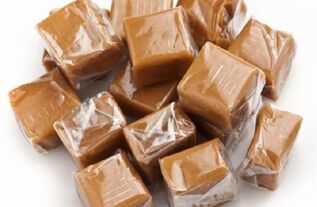不利于牙齿健康的食物
|
Chewy candy The stickier the candy, the worse it tends to be for your teeth. Extra-chewy candies-like taffy, caramels, or Jujyfruits-stick to (and between) teeth for a long time, allowing the bacteria in our mouths to feast leisurely on the deposited sugar. "Bacteria burns sugar to make acid, which dissolves the protective layer of tooth enamel and causes cavities," Messina explains. Candies that are chewy, sugary, and acidic-a category that includes many "sour" varieties-deliver a "triple whammy of negatives," Messina adds, because they carry their own payload of erosive acid, in addition to that produced by the interaction of sugar and bacteria. Hard candy Hard candies such as Jolly Ranchers don't cling to your teeth as readily as chewy candy, but they have their own downside: Unlike, say, chocolate-based sweets, which are chewed quickly and wash away relatively easily, hard candy dissolves slowly, giving bacteria more time to produce harmful acid. To make matters worse, many varieties of hard candy are flavored with citric acid. Pickles Acid (typically provided by vinegar) is essential to the pickling process. It's what gives pickles their sour, salty taste-and it's also what makes them a potential hazard to tooth enamel. In one 2004 study that looked at the eating habits of English teenagers, pickles were the solid food most closely linked with tooth wear. Eating them more than once a day increased the odds of wear by about 85%. Most of us don't eat pickles that often, however, and snacking on them every now and then isn't likely to noticeably affect your dental health, Messina says. Soda It's no secret that drinking too many sugary sodas can breed cavities. What's less well-known is that the acids found in carbonated soft drinks appear to harm teeth even more than the sugar. The upshot? Even sugar-free diet sodas like Diet Coke and Diet Pepsi-which both contain citric and phosphoric acid-can erode enamel. If you can't do without soda, your best bet is to drink it during a meal, rather than sipping it throughout the day. The food will help neutralize the acid, Messina says, and "the time of exposure to the acid is much shorter." |









